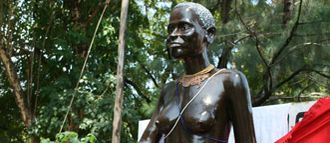مكاتيليلي وا منزا

مكاتيليلي وا منزا Mekatilili Wa Menza (أو Makatilili (عاشت 1855 - 1925) كانت زعيمة كينية، قادت بنشاط شعب گيرياما في تمرد ضد الادارة الاستعمارية البريطانية وسياساتها في 1913 - 1914. شعب گيرياما هو جزء من شعوب ميجيكندا Mijikenda التي تقطن الساحل الكيني؛ ولهم أماكن مقدسة تُدعى كايا، توجد في الغابات، واحداهم، "كايا فونگو"، دمرته الادارة الاستعمارية البريطانية بالديناميت في 1914، بعد أن علمت أن مكاتيليلي تستخدمه مركزاً لادارة التمرد ضد الاستعمار. وقد أطلق عليها البريطانيون لقب "الكينية المجنونة" Mad Kenyan woman.
مقاومتها انصبت على ثلاث قضايا: السخرة في مزارع المطاط، الضريبة البريطانية المفروضة على الأكواخ في الغابات، والاعتداء البريطاني على المقار المقدسة لقبائل جيرياما.
اعتقل البريطانيون مكاتيليلي ونفوها إلى مومياس في المحافظة الغربية. وحسب السجلات الاستعمارية البريطانية، فبعد خمس سنوات، عادت إلى مسقط رأسها حيث واصلت معارضة فرضة السياسات والقرارات الاستعمارية.
وقد توفيت في 1925 [1] أو 1914، ودُفنت في بونگالى، في دائرة ماگاريني، بمقاطعة ماليندي.[2]
. . . . . . . . . . . . . . . . . . . . . . . . . . . . . . . . . . . . . . . . . . . . . . . . . . . . . . . . . . . . . . . . . . . . . . . . . . . . . . . . . . . . . . . . . . . . . . . . . . . . . . . . . . . . . . . . . . . . . . . . . . . . . . . . . . . . . . . . . . . . . . . . . . . . . . . . . . . . . . . . . . . . . . . .
ضريبة الأكواخ
Mekatilili opposed forced labour in British-owned rubber and sisal plantations, the colonial hut tax (forcing every family to give money to the British), land seizure evictions from the fertile Sabaki River Valley and restricted consumption of palm wine.[1]
To attract the crowds to her meetings, she used to move from one village to another dancing Kifudu, a revered dance that was performed only during funeral ceremonies. The women would follow her, their men in tow.
Archival records show that Charles Hobley, who was the Coast provincial commissioner from 1912 to 1919, attributed most of the responsibility for Giriama resistance against colonial labour and taxation policies to “an old blind rascal named Ngonyo” who “instigated a half-mad woman named Katilili to tour the country preaching active opposition to Government.”
She was instrumental in the most important meeting held in Kaya Fungo, the ritual centre of the Giriama, in July and August 1913, where she led the discussions and complained about labour demands and the jurisdiction of the traditional elders being undermined.
She said the wages which headmen received gave the government the belief that they had a right to demand cheap labour.
But the British were not just sitting by. Mekatilili and a male leader of the Giriama resistance, Wanje wa Mwadorikola, were arrested in October 1913 and sentenced to five years detention.
The two were deported to the far west of Kenya, Mumias, but escaped a few months later and walked back home to continue with the resistance.
The British were mesmerised by how she could have walked such a distance through the forest infested with dangerous wild animals. She was again arrested, this time to be sent north to the Somalia border area. Again, she escaped.
Mekatilili was variously described by the British as a “witch” and a “prophetess who gave additional force to the oath in spreading the gospel of violence”.
But her powerful oaths were not to fight the colonialists, but to try to win back those Giriama who had transferred their loyalties to the British.
ذكراها
بالرغم من انجازاتها، فإن مكاتيليلي لم تـُذكر ضمن المناضلين من أجل حرية كينيا حتى 20 أكتوبر 2010، في أول احتفال بـ"ماشجاع" (يوم الأبطال)، حين أميط اللثام عن تمثال لها في حدائق أوهورو في نيروبي — التي تغير اسمها إلى "حديقة مكاتيليلي وا منزا" — تكريماً لها.[1]
انظر أيضاً
للاستزادة
- Elizabeth Mugi-Ndua: Mekatilili Wa Menza : Woman Warrior (Sasa Sema Publications, 2000) ISBN 9966-951-03-2
- Elizabeth Orchardson-Mazrui: The adventures of Mekatilili (East African Educational Publ., 1999) ISBN 9966-25-004-2
- "A Socio-historical Perspective of the Art and Material Culture of the Mijikenda of Kenya", PhD Thesis, School of oriental and African Studies, University of London, London,U.K.
- 2012 Max Dashu, 2012. Mekatilili: prophetess of the 1913 Giriama revolt.[3]
الهامش
- ^ أ ب ت "The 'mad' Kenyan woman who rattled the British". أفريكا ريڤيو. 2013-06-08.
- ^ Daily Nation, August 18, 2009: Malindi honours Kenya freedom heroine
- ^ Max Dashu, 2012
وصلات خارجية
| هذا biographical article related to an African military person هو بذرة. بإمكانك مساعدة المعرفة بأن تنمـِّـيـه. |